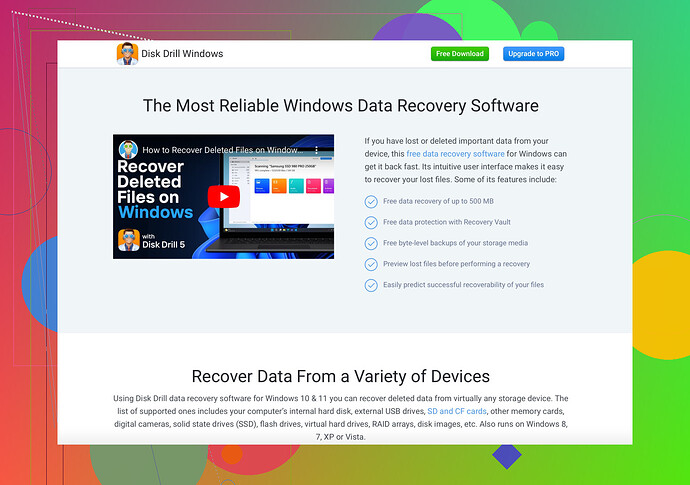I accidentally deleted important recordings from my voice recorder and need to recover them as soon as possible. These files are crucial for a project deadline. How can I get them back? Is there any software or method that works best for this purpose? Any advice or recommendations would be greatly appreciated.
Ugh, what a nightmare! Been there, done that. Alright, straight up, you’ve got a few ways to tackle this and get those files back from your voice recorder.
Step-by-Step Guide:
-
Stop Using the Recorder: This might seem obvious, but seriously, don’t use the recorder until you try to recover the files. This can prevent overwriting the deleted data.
-
Connect to a Computer: Plug your voice recorder into your computer using a USB cable. If it uses a memory card, eject it and use a card reader.
-
Data Recovery Software: Here’s the magic part. Use Disk Drill. It’s a solid choice for this job. Install it on your computer (not the recorder’s memory) to avoid more data loss.
How to Use Disk Drill:
- Install Disk Drill on your computer.
- Launch the software and select the voice recorder or memory card.
- Run the scan to find recoverable files.
- Preview the files to ensure they’re the ones you need.
- Recover the files and save them to a different location on your computer.
Why Disk Drill?
Its user-friendly interface and powerful scanning capabilities make it perfect for data recovery, even for a tech noob.
Quick Tips:
- Regular Backups: Once you get your files back, set up a routine for regular backups. Use cloud storage services or an external hard drive.
- Don’t Delay: The sooner you try to recover the files, the better your chances of success.
Alternatives:
If Disk Drill doesn’t work, you could try other software like Recuva or EaseUS, but Disk Drill is generally highly recommended for its efficiency.
Hope this helps and gets you back on track for that project deadline!
Alright, folks. Let’s dive into alternative solutions and perspectives here.
First off, nothing’s worse than that gut-wrenching moment when you realize crucial audio has been deleted. But hey, not all is lost. You got a few more tricks up your sleeve besides the excellent suggestion of Disk Drill.
Alternative Methods:
-
Check for a Backup: Ideally, this should be your first stop. Some recorders save temp backups. Poke around the settings or manual.
-
Built-in Recovery Options: Did you know some voice recorders come with built-in recovery tools? It’s a long shot, but check out the user manual or the manufacturer’s website for any hints.
-
Professional Data Recovery Services: If the files are ultra-important and software solutions don’t cut it, then seeking a professional data recovery service could be worth every penny. It’s expensive but much more reliable in dire situations.
Different Software:
If you’re up for more software besides Disk Drill (which, let’s face it, is pretty top-notch), try PhotoRec. It’s a free and open-source utility designed for data recovery. It’s a bit more technical but might be perfect if Disk Drill leaves you hanging.
How to Use PhotoRec:
- Download PhotoRec.
- Run the application and select your voice recorder or memory card.
- Follow the prompts to scan for deleted files.
- Recover and save to a different location.
Why it’s Worth a Shot:
PhotoRec’s versatility in dealing with different file types and recovery situations makes it a robust option if you’re comfortable navigating its more technical interface.
Prevent Future Freakouts:
- Comprehensive Backups: Yeah, back up like your life depends on it. Use both cloud and physical backups.
- Memory Card Health Checks: If you’re using a memory card, keep an eye on its health periodically. Corrupted cards can lead to sudden data loss.
My Take:
Don’t beat yourself up about it. We’ve all been there, and thanks to recovery tools like ‘Disk Drill’, there’s a good chance you’ll get your files back. And if not, pro help is always there as a last resort.
Hope this gives you a few more angles to work from! Looking forward to hearing if any of these methods work out for you.
Alright, let’s add some spice and different angles to the mix, folks. Here’s another perspective using a Troubleshooter’s Tone:
Alternative Recovery Pathways:
Cloud and Desktop Syncing: Depending on your device, some voice recorders sync with cloud services or desktop applications automatically. Check if your recordings might be stored or backed up there inadvertently.
Online Recovery Tools
Dr.Fone and iSkysoft: If you’re not getting results with Disk Drill, explore online with Dr.Fone or iSkysoft. They’re respectable alternatives when Disk Drill’s magic doesn’t shine.
Disk Drill Pros and Cons:
Pros:
- User-Friendly Interface: It’s a breeze even for beginners.
- Powerful Scans: High success rate in file recovery.
- Versatility: Supports a vast range of file types.
Cons:
- Cost: The full version can be a bit pricey.
- Speed: Extensive scans may take considerable time.
If All Else Fails:
Consider the DIY Hardware Fix. Sometimes, it’s a hardware read issue, not a deletion. A different memory card reader or USB cable might unlock access to those hidden files.
Here’s a wild card: Restore Recently Deleted Items. Some devices have a ‘Recently Deleted’ section you might’ve overlooked.
Quick Checks for Next Time:
- Regular Sync and Backups: Make it a habit.
- Protect Your Card: Use high-quality memory cards to reduce data corruption risks.
Each voice recorder has its quirks, so don’t overlook the manual or the manufacturer’s software. Sometimes, simplicity is the key—just be thorough and exhaust all possibilities. What methods worked best for others might still have a trick or two for you!
